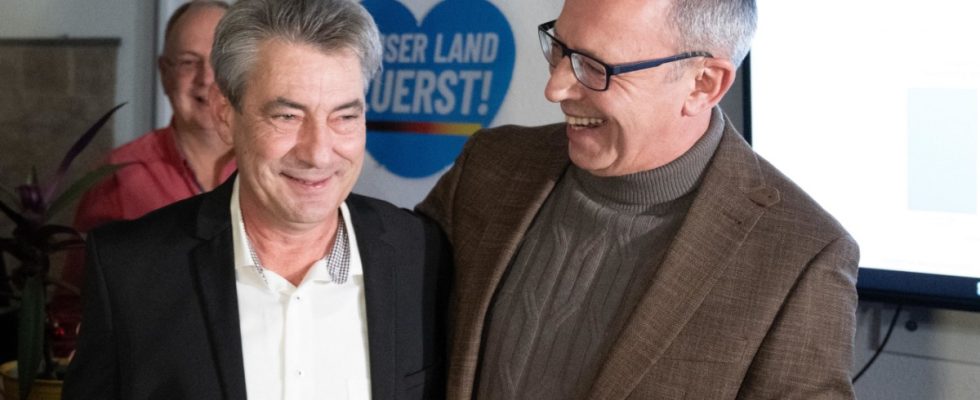You can measure the magnitude of an election success in sober numbers, by the cheers of your own supporters or by the mutual blame of the losers. In the Saxon city of Pirna, which has a population of 40,000, it is worth taking a look at all three categories. The AfD celebrated on Sunday because its candidate Tim Lochner won the first mayor’s chair for the regional association, which had just been classified as right-wing extremist. “This is a great opportunity for our party for next year,” said state leader Jörg Urban to the German Press Agency. “We want to win here in Saxony, we want to win significantly, we want to get close to 40 percent.”
If you look at the numbers, the pass isn’t quite as impressive as the AfD would like. The independent Lochner received 38.5 percent in the second round of voting, so more than 60 percent of those eligible to vote did not vote for the AfD candidate and former CDU man. And almost every second person eligible to vote did not even vote.
Lochner benefited above all from a special feature of Saxon local electoral law: All candidates are allowed to run again in the second round of mayoral elections and not just the top two. With Ralf Thiele for the Free Voters and Kathrin Dollinger-Knuth (CDU), two in Pirna decided to continue, both got just over 30 percent on Sunday. And it didn’t take long until the CDU and Free Voters looked for and found blame in the other camp.
“Stirrup holder for the AfD”
Free Voters leader Thomas Weidinger sharply criticized the CDU on Monday. She was unable to support Thiele after the first round of voting. “Instead, with the CDU candidate running again, they consciously accepted that they would play the stirrup holder for the AfD.” Dollinger-Knuth, who also supported the SPD, the Greens and the Left in the second round, said on Sunday evening: “Although we have gathered almost all forces behind our political offer, the voters have decided differently. Unfortunately, the Free Voters have decided to carry on alone and thus paved the way for AfD success.” You have to accept both.
The AfD won a district election for the first time in Sonneberg, Thuringia, in the summer, and its candidate prevailed in the mayoral election in Raguhn-Jeßnitz (Saxony-Anhalt). However, the AfD recently lost in the mayoral elections in Nordhausen (Thuringia) and Bitterfeld-Wolffen (Saxony-Anhalt), also because all other parties supported the respective incumbent. Next year, a new state parliament will be elected in Saxony – just like in Thuringia and Brandenburg. In recent surveys, the AfD is on a par with the CDU, which has been Prime Minister in Saxony since 1990 and is currently governing Kenya in a coalition with the SPD and the Greens.
Saxony’s Interior Minister Armin Schuster (CDU) wrote on platform .” The Green Bundestag member Paula Piechotta wrote on
The Free Voters in Saxony want to enter the state parliament for the first time in the state elections next year. They are relying on a top candidate who is well known and popular in Saxony: Matthias Berger, the mayor of Grimma, who has been known to a nationwide audience since the flood of the century in 2002. Before that, however, there are still local elections, which will take place on June 9th parallel to the European elections. Saxony’s AfD leader Urban has already announced that the AfD could send independent candidates into the race in many places, as is now the case in Pirna. “We will certainly have many similar constellations in the local elections next year – that there will be people on our lists who are not necessarily AfD members and who will bring good results,” said Urban.
Auschwitz Committee complains about “bitter signal”
Urban was unimpressed by the assessment of the Federal Office for the Protection of the Constitution, which classified the Saxon AfD as definitely right-wing extremist a week and a half ago. The Office for the Protection of the Constitution is convinced that the Saxony regional association is also dominated by the former wing and its spiritual father and leader Björn Höcke from Thuringia. In the opinion of the Office for the Protection of the Constitution, numerous substantive positions in Saxony violate the basic principles of the free democratic basic order, such as human dignity enshrined in Article 1 of the Basic Law.
The International Auschwitz Committee reacted with corresponding concern to the election results on Monday. The result is “a bitter signal to all representatives of the democratic parties,” explained Executive Vice President Christoph Heubner. This is possible if the democratic parties cannot agree on a common approach and leave the field to the AfD.
Election winner Lochner announced that his first official act would be to forego a company car and would soon get to know all the employees in the town hall as personally as possible – and check their loyalty.

